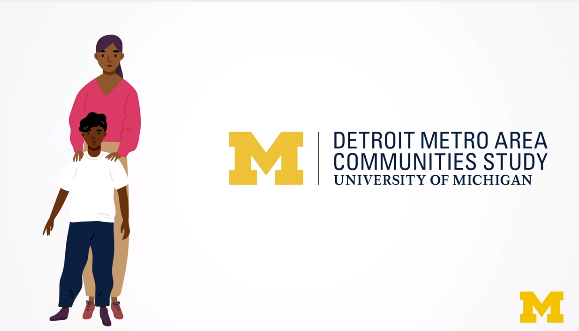While there was no evidence of significant gender differences in who was unemployed, the reported reasons for unemployment were different among women and men. Forty percent of unemployed women report they are not working in part due to family obligations, compared to only 12% of unemployed men.
-
August 23, 2021
Detroit’s jobless rate drops faster than expected, some sectors show strong growth, U-M forecast finds
The study finds the average wage rate at jobs located in Detroit last year was around 23% higher than in the state overall. However, high wages at those employers don’t translate into high average wages for city residents. Wage and salary income for an employed resident averaged $36,100 in 2020.
-
August 20, 2021
Low vaccination rates persist in Detroit households with children
The discomfort that many adults feel toward vaccinating the children in their household is also evident in their willingness to obtain a COVID-19 vaccine for themselves. Adults living in Detroit households with children are about half as likely (38%) as adults living in Detroit households without children (70%) to report that they have been vaccinated against COVID-19.
-
August 20, 2021
Detroit’s small business owners see summer boost through entrepreneurs project
In 2021, the program evolved again with 31 students. They partnered with 19 Detroit-based businesses that wanted insights, information and execution on real projects that could help them not only survive this historical moment but find additional customers, develop new processes and develop long-lasting revenue.
-
August 12, 2021
MIDAS joins Microsoft, city of Detroit to enhance digital inclusion
As one of the least connected major U.S. cities, the need to close the digital divide in Detroit is significant. Over a third of households in Detroit lack broadband internet access, defined federally as a 25 megabits per second download speed and 3 megabits per second upload speed. Lack of access compounds dozens of other quality-of-life issues and dramatically affects access to education, the ability to find better jobs or to gain timely information about the COVID-19 pandemic.
-
August 12, 2021
FIRST PERSON: Learning from Detroit businesses and fellow students
“To maximize our impact, each team is focusing on one specific area of need so we can address that same problem in multiple companies and develop expertise in that area. As a result, we have eight teams: four focusing on marketing problems and four focusing on operations.”
~ Michael Willard -
August 2, 2021
Sirota: designing cultural infrastructure for a broad public
Much of Akoaki’s other current work is centered on Detroit’s historic North End, a once-thriving entertainment district that today retains few physical markers of that legacy.
-
July 28, 2021
Henry Russel Lecturer, award winners named for 2022
Roshanak Mehdipanah, assistant professor of health behavior and health education, School of Public Health, was one of four faculty members who will receive Henry Russel Awards, the university’s highest honor for faculty members at the early to mid-career stages. She joined U-M in 2015 and has forged deep partnerships with Detroit community-based organizations and leaders.
-
July 28, 2021
Addressing links between poverty, housing, water access and affordability in Detroit
The policy brief shows that existing programs, while they provide improvements, fail to meet the amount of Detroit households in need of aid to make substantial repairs.


